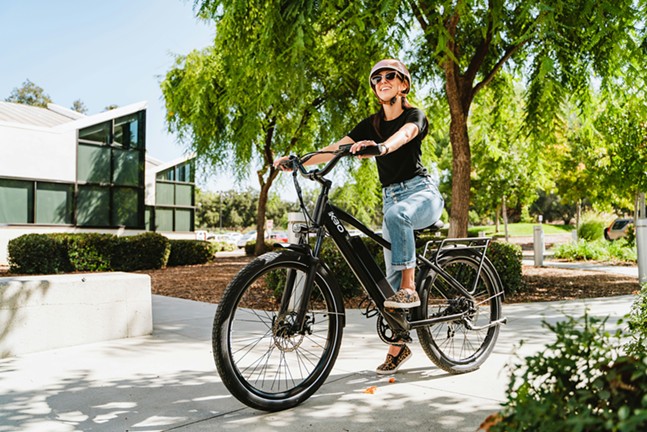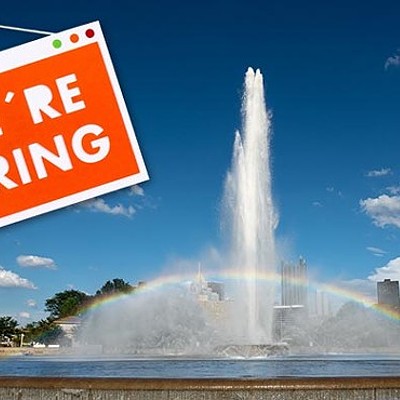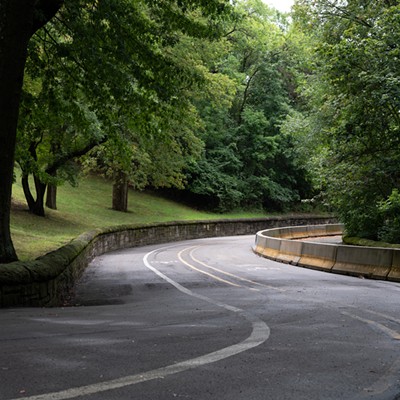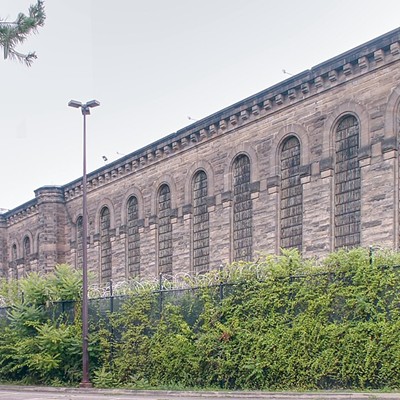Transit Talk: Please pay for my e-bike
[
{
"name": "Local Action Unit",
"component": "24929589",
"insertPoint": "3",
"requiredCountToDisplay": "1"
}
]
If you can bike in Pittsburgh, you can bike anywhere. While that used to be easier said than done, the city’s cycling infrastructure is better than ever, and a new piece of technology has made riding around this hilly town far faster: the e-bike.
E-bikes have exploded in popularity over the past few years. While they accounted for a tiny fraction of the U.S.’s bicycles in 2015, e-bikes now make up about 5% of the bike market. Said market is growing steadily and is worth over $2 billion and climbing. E-bikes themselves have also fallen in price: after years of $2,000-and-up pricing, most e-bike companies now offer solid entry-level models for between $700 and $1,200.
That’s not nothing, though. To really incentivize widespread adoption of e-bikes and other carbon-offsetting micromobility solutions, we need to make them less of a pain in the wallet.
There are plenty of models for what this could look like legislatively. One is currently stalled in the U.S. House. The Electric Bicycle Incentive Kickstart for the Environment (EBIKE) Act would allow “individual taxpayers a new tax credit for 30% of the cost of a qualified electric bicycle” under $8,000. The bill, introduced in March 2023, was referred to the Ways & Means Committee and awaits further action. Given the current state of Congress, I’m not holding my breath for the EBIKE Act to pass, but it would make a big difference in lowering costs nationwide.
Closer to home, Pennsylvania has an awesome rebate program to incentivize residents of the commonwealth to ditch their gas-guzzlers. They’ll pay out 500 rebates of up to $3,000 for customers switching to electric and hybrid vehicles through next June as funding lasts. Neat! There’s just one problem here: electric scooters, mopeds, and e-bikes aren’t on the list of vehicles people can get rebates for.
As with most environmentally friendly things, California is ahead of the curve. Income-qualified Golden State residents can get up to $2,000 toward their first e-bike. And Cali’s not alone — dozens of states, cities, and other jurisdictions have passed or proposed rebates, tax credits, e-bike lending libraries, and more to get more people in the battery-powered saddle. The only sad thing about this list is that Pa. isn’t on it.
Pittsburgh isn’t up a steep hill with an empty battery. We have POGOH, and BikePGH has an E-BikePGH resources page with useful info for new e-bike riders. Most local bike retailers also carry e-bikes in some form, which marks a change from before the COVID-19 pandemic.
But financial help would be a huge motivator for people who can’t afford an e-bike. It would also give better-off would-be riders more of a reason to take a risk and purchase one. It’s a sort of Field of Dreams scenario — if you offer the incentives, people will use them. That means more people riding e-bikes, which means more people seeing people on e-bikes, which means more people thinking about e-bikes as something with a place in their own lives.
Just think how much zippier your new steed would feel with a big, fat rebate. The new Penn Circle lanes with their cheery green paint spread before you. Cycling is awesome, but who knew it could be so fast? Pedaling easily up the hill home past glum-looking car commuters, the only sweat you’ll be breaking is from carrying around all the extra money you saved on gas, parking, and even your new e-bike itself.
Whether it’s $50 or $500, give us e-bike incentives! The thousands of Pittsburghers who’d benefit would certainly appreciate a little more cash in their wallet. Then, we can get to the important business of educating drivers and riders alike how to actually share the city’s roads…
E-bikes have exploded in popularity over the past few years. While they accounted for a tiny fraction of the U.S.’s bicycles in 2015, e-bikes now make up about 5% of the bike market. Said market is growing steadily and is worth over $2 billion and climbing. E-bikes themselves have also fallen in price: after years of $2,000-and-up pricing, most e-bike companies now offer solid entry-level models for between $700 and $1,200.
That’s not nothing, though. To really incentivize widespread adoption of e-bikes and other carbon-offsetting micromobility solutions, we need to make them less of a pain in the wallet.
There are plenty of models for what this could look like legislatively. One is currently stalled in the U.S. House. The Electric Bicycle Incentive Kickstart for the Environment (EBIKE) Act would allow “individual taxpayers a new tax credit for 30% of the cost of a qualified electric bicycle” under $8,000. The bill, introduced in March 2023, was referred to the Ways & Means Committee and awaits further action. Given the current state of Congress, I’m not holding my breath for the EBIKE Act to pass, but it would make a big difference in lowering costs nationwide.
Closer to home, Pennsylvania has an awesome rebate program to incentivize residents of the commonwealth to ditch their gas-guzzlers. They’ll pay out 500 rebates of up to $3,000 for customers switching to electric and hybrid vehicles through next June as funding lasts. Neat! There’s just one problem here: electric scooters, mopeds, and e-bikes aren’t on the list of vehicles people can get rebates for.
As with most environmentally friendly things, California is ahead of the curve. Income-qualified Golden State residents can get up to $2,000 toward their first e-bike. And Cali’s not alone — dozens of states, cities, and other jurisdictions have passed or proposed rebates, tax credits, e-bike lending libraries, and more to get more people in the battery-powered saddle. The only sad thing about this list is that Pa. isn’t on it.
Pittsburgh isn’t up a steep hill with an empty battery. We have POGOH, and BikePGH has an E-BikePGH resources page with useful info for new e-bike riders. Most local bike retailers also carry e-bikes in some form, which marks a change from before the COVID-19 pandemic.
But financial help would be a huge motivator for people who can’t afford an e-bike. It would also give better-off would-be riders more of a reason to take a risk and purchase one. It’s a sort of Field of Dreams scenario — if you offer the incentives, people will use them. That means more people riding e-bikes, which means more people seeing people on e-bikes, which means more people thinking about e-bikes as something with a place in their own lives.
Just think how much zippier your new steed would feel with a big, fat rebate. The new Penn Circle lanes with their cheery green paint spread before you. Cycling is awesome, but who knew it could be so fast? Pedaling easily up the hill home past glum-looking car commuters, the only sweat you’ll be breaking is from carrying around all the extra money you saved on gas, parking, and even your new e-bike itself.
Whether it’s $50 or $500, give us e-bike incentives! The thousands of Pittsburghers who’d benefit would certainly appreciate a little more cash in their wallet. Then, we can get to the important business of educating drivers and riders alike how to actually share the city’s roads…


















